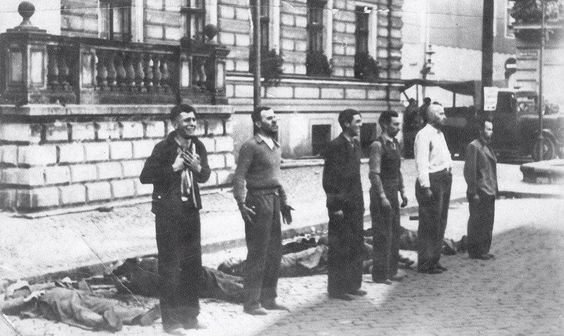Monday 2 October 1939
 |
| Reichsstatthalter and Gauleiter Arthur Karl Greiser, a chief organizer of the Holocaust, in Poznań, Poland, 1939 (Haine, Federal Archive Picture 183-1998-0109-502). |
The Polish Polesie Independent Operational Group (18,000 men), led by General Franciszek Kleeberg, is the only Polish formation left in the field. It has concentrated between the Bug and Vistula Rivers in deep forests. The German XIV Motorised Corps (General Gustav Anton von Wietersheim) and 13th Motorised Division (General Paul Otto) figure that the Poles are just waiting to surrender. Otto sends a small force that attacks several times during the day but is beaten off. He resolves to send larger forces.
Soviet/Estonian Relations: The Latvian Foreign Minister, M. Munters, arrives in Moscow for talks with Molotov. Molotov demands Soviet bases or else the USSR will occupy Latvia.
European Air Operations: RAF planes perform night reconnaissance over Berlin and drop some leaflets.
Battle of the Atlantic: Swedish steamer Gun sunk by U-Boat. U-boats are now operating without warning.
Western Front: The French report light German attacks.
British Government: The British Embassy in Washington D.C. works up a priority list of U.S. armaments that Great Britain needs most desperately in case the US ban on exports was to "be amended." Category 1 includes 'Gun liners" and "Small arms ammunition, shell bodies, cartridge cases." Further down the list is "Aircraft of all kinds."
US Government: The US Senate opens debate on the neutrality bill.
British Homefront: Tribunals are established to process the 50,000 primarily German enemy aliens registered in London.
Czech Government-in-Exile: An agreement is reached with France to raise a Czech National Army in Exile.
Latin America: There is a Declaration of a 300-mile neutrality zone at the Panama Conference.
American Homefront: Louis Armstrong performs at Carnegie Hall, leading off with "When It's Sleepy Time Down South."
Future History: Cosmonaut Yuri Glazkov is born in Moscow. He joins the cosmonaut corps in 1965 and flies (floats?) on the Soyuz 24 mission. He receives the Hero of the Soviet Union award. Glazkov passed away in 2008.
 |
| German soldiers, taken prisoner by the Polish army during the German invasion, are shown being held captive in Warsaw, on October 2, 1939. (AP). |
October 1939
October 1, 1939: Occupation of WarsawOctober 2, 1939: Hel Peninsula Falls
October 3, 1939: The Diamantis Incident
October 4, 1939: Otto Kretschmer Gets Rolling
October 5, 1939: Polish Resistance Ends
October 6, 1939: Hitler Peace Effort
October 7, 1939: The British Have Arrived
October 8, 1939: First RAF Kill from UK
October 9, 1939: "City of Flint" Incident
October 10, 1939: Lithuania Under Pressure
October 11, 1939: The Atomic Age Begins
October 12, 1939: England Rejects Hitler's Peace Offer
October 13, 1939: Charles Lindbergh Speaks Out
October 14 1939: Royal Oak Sunk
October 15, 1939: Cuban Rockets
October 16, 1939: First Aircraft Shot Down Over UK
October 17, 1939: Marshall Mannerheim Returns
October 18, 1939: Prien Receives His Award
October 19, 1939: Preliminary Plan for Fall Gelb
October 20, 1939: Hitler Grapples with the Jews
October 21, 1939: Hurricanes to the Rescue!
October 22, 1939: Goebbels Lies Through His Teeth
October 23, 1939: Norway the Center of Attention
October 24, 1939: German "Justice" Gets Rolling
October 25, 1939: Handley Page Halifax Bomber First Flies
October 26, 1939: Jozef Tiso Takes Slovakia
October 27, 1939: King Leopold Stands Firm
October 28, 1939 - First Luftwaffe Raid on Great Britain
October 29, 1939: Tinkering with Fall Gelb
October 30, 1939: Defective Torpedoes
October 31, 1939: Molotov Issues an Ultimatum




